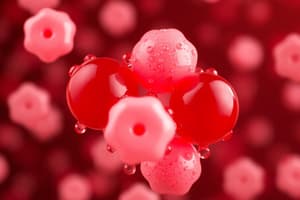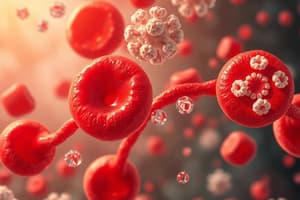Podcast
Questions and Answers
___________ carry oxygen and carbon dioxide in the blood
___________ carry oxygen and carbon dioxide in the blood
Red Blood Cells
___________ are responsible for blood clotting
___________ are responsible for blood clotting
Platelets
___________ are a type of white blood cell involved in immune response
___________ are a type of white blood cell involved in immune response
Monocyte
___________ are white blood cells involved in allergic reactions and parasitic infections
___________ are white blood cells involved in allergic reactions and parasitic infections
___________ are the most abundant type of white blood cell and are part of the immune system
___________ are the most abundant type of white blood cell and are part of the immune system
Erythrocytes are the most common of the formed ______
Erythrocytes are the most common of the formed ______
Thrombocytes are ______ of the formed elements
Thrombocytes are ______ of the formed elements
Leukocytes are the least common of the formed ______
Leukocytes are the least common of the formed ______
Formed elements of blood consist of cells, erythrocytes, and ______
Formed elements of blood consist of cells, erythrocytes, and ______
Differential Blood Count includes the count of formed elements such as erythrocytes, leukocytes, and ______
Differential Blood Count includes the count of formed elements such as erythrocytes, leukocytes, and ______
Differential Blood Count: Formed Elements of Blood Whole blood Blood after ______
Differential Blood Count: Formed Elements of Blood Whole blood Blood after ______
Centrifugation Plasmal and platelets (55%) White cells Red cells (45%)
Centrifugation Plasmal and platelets (55%) White cells Red cells (45%)
Differential Blood Count: ______ Elements of Blood
Differential Blood Count: ______ Elements of Blood
______ and platelets (55%) White cells Red cells (45%)
______ and platelets (55%) White cells Red cells (45%)
Blood after centrifugation ______ and platelets (55%) White cells Red cells (45%)
Blood after centrifugation ______ and platelets (55%) White cells Red cells (45%)
Formed Elements in Blood: Leukocytes Leukocyte S Granulocytes Agranulocyte Basophil Eosinophil ______ Lymphocyte Monocytes/ S S Macrophages B T NK
Formed Elements in Blood: Leukocytes Leukocyte S Granulocytes Agranulocyte Basophil Eosinophil ______ Lymphocyte Monocytes/ S S Macrophages B T NK
These cells are part of 'Adaptive ______'
These cells are part of 'Adaptive ______'
Formed Elements in Blood: Leukocytes Leukocyte S Granulocytes Agranulocyte ______ Eosinophil Neutrophils Lymphocyte Monocytes/ S S Macrophages B T NK
Formed Elements in Blood: Leukocytes Leukocyte S Granulocytes Agranulocyte ______ Eosinophil Neutrophils Lymphocyte Monocytes/ S S Macrophages B T NK
Formed Elements in Blood: Leukocytes Leukocyte S Granulocytes Agranulocyte Basophil ______ Neutrophils Lymphocyte Monocytes/ S S Macrophages B T NK
Formed Elements in Blood: Leukocytes Leukocyte S Granulocytes Agranulocyte Basophil ______ Neutrophils Lymphocyte Monocytes/ S S Macrophages B T NK
Formed Elements in Blood: Leukocytes Leukocyte S Granulocytes Agranulocyte Basophil Eosinophil Neutrophils Lymphocyte Monocytes/ S S Macrophages ______ T NK
Formed Elements in Blood: Leukocytes Leukocyte S Granulocytes Agranulocyte Basophil Eosinophil Neutrophils Lymphocyte Monocytes/ S S Macrophages ______ T NK
___________ Usually smaller, very round cells Darker nucleus occupying most of cell Very little cytoplasm showing
___________ Usually smaller, very round cells Darker nucleus occupying most of cell Very little cytoplasm showing
Lymphocytes Usually smaller, very round cells Darker nucleus occupying most of cell Very little cytoplasm ________
Lymphocytes Usually smaller, very round cells Darker nucleus occupying most of cell Very little cytoplasm ________
Lymphocytes Usually smaller, very round cells ________ nucleus occupying most of cell Very little cytoplasm showing
Lymphocytes Usually smaller, very round cells ________ nucleus occupying most of cell Very little cytoplasm showing
Lymphocytes Usually smaller, very ________ cells Darker nucleus occupying most of cell Very little cytoplasm showing
Lymphocytes Usually smaller, very ________ cells Darker nucleus occupying most of cell Very little cytoplasm showing
Lymphocytes Usually smaller, very round ________ Darker nucleus occupying most of cell Very little cytoplasm showing
Lymphocytes Usually smaller, very round ________ Darker nucleus occupying most of cell Very little cytoplasm showing
Study Notes
Formed Elements of Blood
- Formed elements of blood consist of: Cells (Erythrocytes & Leukocytes), Cell fragments, and Thrombocytes
- Erythrocytes are the most common of the formed elements
- Thrombocytes are the second most abundant, while Leukocytes are the least common of the formed elements
Leukocytes
- Leukocytes can be classified into two main categories: Granulocytes and Agranulocytes
- Granulocytes include:
- Basophil
- Eosinophil
- Neutrophils
- Agranulocytes include:
- Lymphocyte (includes B cells, T cells, and NK cells)
- Monocytes/Macrophages
Characteristics of Lymphocytes
- Lymphocytes are usually smaller, very round cells
- They have a darker nucleus that occupies most of the cell
- They have very little cytoplasm showing
Studying That Suits You
Use AI to generate personalized quizzes and flashcards to suit your learning preferences.
Description
Test your knowledge on the formed elements of blood including red blood cells, platelets, monocytes, white blood cells, eosinophils, basophils, lymphocytes, and neutrophils. Identify and understand the different types of cells present in blood.




